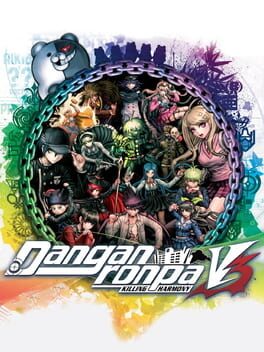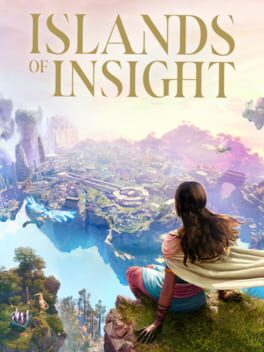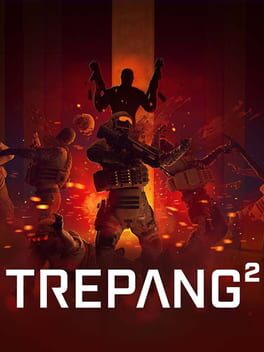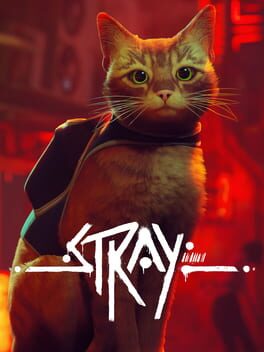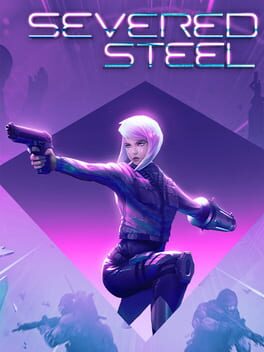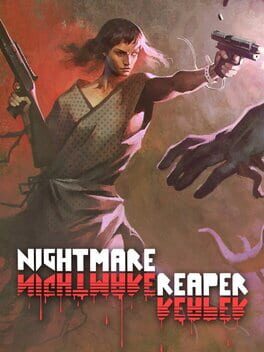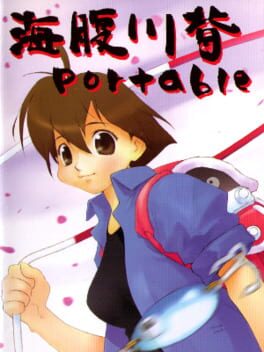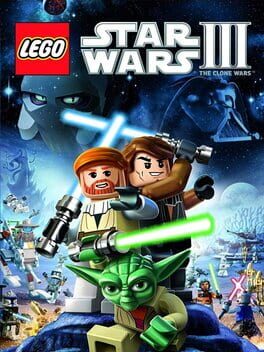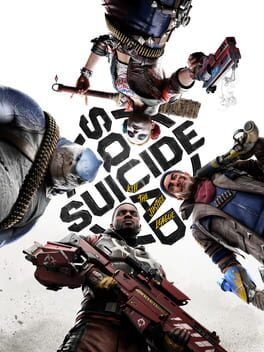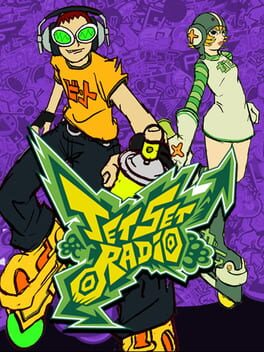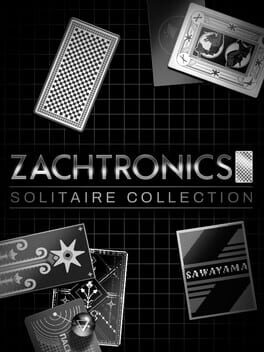Hologon
244 Reviews liked by Hologon
it's honestly fitting how they perfectly predicted how people would react and everyone still lacks the self awareness to realize they are proving the devs right
i don't know what to say tbh. aside from it being the definitive peak of an already amazing series (probably my fav oat now) the themes in this game are incredible, it's a beautifully done work of art that i just..i just love it so much. thank you, danganronpa.
i don't know what to say tbh. aside from it being the definitive peak of an already amazing series (probably my fav oat now) the themes in this game are incredible, it's a beautifully done work of art that i just..i just love it so much. thank you, danganronpa.
Yakuza 0
2015
Islands of Insight
2024
I've seen that Sonic meme about wanting to pay more for smaller games with worse graphics, etc. and I vibe with it as much as the next guy, but it's rare for me to encounter a game that I actually feel like I would have enjoyed substantially more if only substantially less work had gone into it.
Islands of Insight is a game about solving a zillion logic puzzles dotted throughout a number of serene, scenic locales. And that's already a winning formula, as the success of The Witness and The Talos Principle can attest to. That's all I needed. And if that's all there was to Islands of Insight, it would be a reputable entry in the genre. The cornerstone of the game is the Logic Grid, which is a consistently fun time with all the myriad rules that get added, twisted, and blended together over the course of the game. In addition to these are a variety of other puzzle types, which cover pretty broad spectra of difficulty, engagement, and quality. Some, like the classic block-sliding puzzles, are similarly cerebral to the Logic Grids, whereas others, like the hidden objects and perspective-based Skydrops, are tiny little things that you can pop off as you make your way from one major objective to another. Many of the puzzle types didn't vibe with me, like the crystal mazes or the fractal thing, but they're easy to ignore and simple enough to not be frustrating even when mandatory. The only hard stop I encountered was the music grid, which past a certain complexity level just requires a brain function that I don't have (now that I think of it, I think these are what made me drop The Witness too).
But however much joy the simple act of solving puzzles brings, it's marred by the game's greater ambitions. The online aspect is weird, on the face of it - the game seems to have been initially pitched as some kind of puzzle-MMO but player interactivity is heavily limited and the puzzles themselves are all single-player affairs, necessitating the removal of the "online co-op" tag a few days past release. I don't particularly care about any of this, as I was planning to ignore the online aspect completely. But there's one part of it you can't ignore, and that's the server lag. In multiple play sessions I found myself experiencing constant rubber-banding, to the extent that the more movement-centric puzzles became impossible to complete.
Additionally, although there are no microtransactions or anything in the game, there's still this "live-servicey" energy permeating the entire game, where puzzles will routinely appear, disappear, and reset, such that you can never actually completely clear any of the hub areas and instead progress through them by grinding out puzzles over multiple play sessions. This was probably intended to give the game more longevity through more content, but ironically had the opposite effect for me - most puzzles became disposable to me when I realized this, and I would bypass them entirely if they took more than a second or two to solve. This is only true of the hub areas, though - the main progression is done through more classically-designed Enclaves. These are still quite fun, and some of them take advantage of their hand-crafted nature to give the more boring puzzle types like the mazes a unique twist. Maybe it's a blessing in disguise that I learned to ignore the hub areas, since that funneled me towards the best content that much faster.
I didn't engage with the story at all, because the Ubisoft-y dopamine loop of making numbers go up kept me cranking through puzzles at a breakneck pace. However, I think it can be accurately summarized as "if you swallow all the cubes you are legally a master".
Islands of Insight is a game about solving a zillion logic puzzles dotted throughout a number of serene, scenic locales. And that's already a winning formula, as the success of The Witness and The Talos Principle can attest to. That's all I needed. And if that's all there was to Islands of Insight, it would be a reputable entry in the genre. The cornerstone of the game is the Logic Grid, which is a consistently fun time with all the myriad rules that get added, twisted, and blended together over the course of the game. In addition to these are a variety of other puzzle types, which cover pretty broad spectra of difficulty, engagement, and quality. Some, like the classic block-sliding puzzles, are similarly cerebral to the Logic Grids, whereas others, like the hidden objects and perspective-based Skydrops, are tiny little things that you can pop off as you make your way from one major objective to another. Many of the puzzle types didn't vibe with me, like the crystal mazes or the fractal thing, but they're easy to ignore and simple enough to not be frustrating even when mandatory. The only hard stop I encountered was the music grid, which past a certain complexity level just requires a brain function that I don't have (now that I think of it, I think these are what made me drop The Witness too).
But however much joy the simple act of solving puzzles brings, it's marred by the game's greater ambitions. The online aspect is weird, on the face of it - the game seems to have been initially pitched as some kind of puzzle-MMO but player interactivity is heavily limited and the puzzles themselves are all single-player affairs, necessitating the removal of the "online co-op" tag a few days past release. I don't particularly care about any of this, as I was planning to ignore the online aspect completely. But there's one part of it you can't ignore, and that's the server lag. In multiple play sessions I found myself experiencing constant rubber-banding, to the extent that the more movement-centric puzzles became impossible to complete.
Additionally, although there are no microtransactions or anything in the game, there's still this "live-servicey" energy permeating the entire game, where puzzles will routinely appear, disappear, and reset, such that you can never actually completely clear any of the hub areas and instead progress through them by grinding out puzzles over multiple play sessions. This was probably intended to give the game more longevity through more content, but ironically had the opposite effect for me - most puzzles became disposable to me when I realized this, and I would bypass them entirely if they took more than a second or two to solve. This is only true of the hub areas, though - the main progression is done through more classically-designed Enclaves. These are still quite fun, and some of them take advantage of their hand-crafted nature to give the more boring puzzle types like the mazes a unique twist. Maybe it's a blessing in disguise that I learned to ignore the hub areas, since that funneled me towards the best content that much faster.
I didn't engage with the story at all, because the Ubisoft-y dopamine loop of making numbers go up kept me cranking through puzzles at a breakneck pace. However, I think it can be accurately summarized as "if you swallow all the cubes you are legally a master".
Trepang2
2023
Only played the demo. Despite being inspired by FEAR it lacks basically everything that makes FEAR the best shoot ever. Arenas are nowhere near as tightly designed or cleanly readable, instead being blanketed in a lot of darkness and confusing clutter so you can't play and execute with the degree of simplicity that you might in FEAR.
The chaos of gunfights is also severely neutered by this over complication of design, as you will never ever get the sensation of blowing an office to a billion fucking pieces like you do in FEAR. Not to mention I find the arsenal not as compelling and too busy for its own good.
Also some SCP meme stuff going on. Whatever man, I don't care. Not buying.
The chaos of gunfights is also severely neutered by this over complication of design, as you will never ever get the sensation of blowing an office to a billion fucking pieces like you do in FEAR. Not to mention I find the arsenal not as compelling and too busy for its own good.
Also some SCP meme stuff going on. Whatever man, I don't care. Not buying.
Stray
2022
Severed Steel
2021
There's not a ton of complexity as to how Severed Steel operates and some elements need fine-tuning, but I can't help but appreciate how much the game accomplishes with surprisingly little. I'm a fan of the simple and effective UI; your aiming reticle is surrounded by two bars that convey how much ammo and slo-mo time is left (so these gauges are always near the center of attention) and the flashing light on your gun also changes color (from light neon colors to yellow to red) so you're constantly keyed in on when you'll need to pick up a gun early or engage/disengage when running low on supplies. Enemies stand out from the environment thanks to the cel-shaded enemy outlines, and upon death emit a distinct explosion sound-effect so there's no ambiguity when quickly rifling through targets during firefights or when picking off enemies from afar. Guns feel great to aim and fire in slow-mo, mainly because there's very noticeable recoil when firing in real-time; the contrast really helps sell the necessity of the feature. I also love Severed Steel's kick as both a form of attack and traversal; the obvious purpose is your primary melee attack while holding a gun if you don't want to expend your limited magazine to finish off an enemy as well as kicking open doors, but it can also be used to quickly ascend up walls or kick off of grounded/aerial enemies if your double jump isn't enough. The same goes for the arm cannon; you can fire holes into any surface if you don't feel like hunting down stairs/doorways for objectives, but it also provides a nice desperation option to instantly eliminate shielded enemies or drop heavy grunts down to another floor if you find yourself without a weapon.
Despite the appealing core gameplay, Severed Steel can often feel a bit repetitive. Enemy variety feels lacking since the player is usually approaching enemies in a similar manner (that is, entering slo-mo while using stunts to efficiently dispatch foes while firing into their heads/backsides), and I would have liked to see enemies that had to be specifically eliminated using the arm cannon or melee as mix-ups. The Rogue Steel mode does touch upon this with random enemy buffs that force such approaches, but at times I feel like this mode prefers to lengthen combat by overwhelming the player with excess enemies with more health. I do think the game could have also leaned a bit more into its parkour elements with additional stages that focused upon traversal and dodging/quickly disposing of enemies, as there were only a couple of timed story missions that necessitated a rush to the end. Finally, I have to agree with HotPocketHPE that the slo-mo gauge is unbalanced; you'll practically never run out of bullet time as long as you're staying in stunt mode (super easy since there are floors and walls aplenty to slide and wallrun), though this is again addressed from playing Rogue Steel via the "Rebalanced Bullet-Time" unlockable modifier. Even with these gripes however, Severed Steel is a pretty easy recommendation considering how content-rich the game is from its many different modes and extra campaign/workshop levels to tinker with. It was an absolute steal at 80% off on the Steam Spring Sale, and I can't wait to see how Greylock Studio iterates and improves upon their already fantastic formula.
Despite the appealing core gameplay, Severed Steel can often feel a bit repetitive. Enemy variety feels lacking since the player is usually approaching enemies in a similar manner (that is, entering slo-mo while using stunts to efficiently dispatch foes while firing into their heads/backsides), and I would have liked to see enemies that had to be specifically eliminated using the arm cannon or melee as mix-ups. The Rogue Steel mode does touch upon this with random enemy buffs that force such approaches, but at times I feel like this mode prefers to lengthen combat by overwhelming the player with excess enemies with more health. I do think the game could have also leaned a bit more into its parkour elements with additional stages that focused upon traversal and dodging/quickly disposing of enemies, as there were only a couple of timed story missions that necessitated a rush to the end. Finally, I have to agree with HotPocketHPE that the slo-mo gauge is unbalanced; you'll practically never run out of bullet time as long as you're staying in stunt mode (super easy since there are floors and walls aplenty to slide and wallrun), though this is again addressed from playing Rogue Steel via the "Rebalanced Bullet-Time" unlockable modifier. Even with these gripes however, Severed Steel is a pretty easy recommendation considering how content-rich the game is from its many different modes and extra campaign/workshop levels to tinker with. It was an absolute steal at 80% off on the Steam Spring Sale, and I can't wait to see how Greylock Studio iterates and improves upon their already fantastic formula.
This game was such a wonderful experience. The only thing that got a little boring was some of the world intel stuff. It got pretty repetitive by the third region. Other than that the continuation of the story from Remake was done beautifully. It was nice seeing the full cast of characters even if you didn't get to play as all of them (I really wanted to play as Vincent lol). Overall I highly recommend this game.
Nightmare Reaper
2022
Has its bursts of fun but it can be really tiresome. I think part of this is the game is just too long. The levels are incredibly same-y, all procedurally generated so you're more or less experiencing the same level several times in a row. There are 3 chapters, each of those has like 9 sections, and each of those has 3 levels. I don't think it's the best format for a "roguelite" because it lowers the stakes, there are no runs, and if you find one really good weapon it will carry you through the entire game.
Nightmare Reaper
2022
In terms of straight up gameplay, "Nightmare Reaper" is absolutely fantastic! Combat is fast, thrilling, and gruesome; everything you could want out of a boomer shooter! The huge array of enemies, weapons, and levels makes the game feel incredibly massive, and the large amount of upgrades achievable through cute little retro-minigames are great (though admittedly, a little confusing outside the primary skill tree). The story is also pretty interesting. Its told entirely through level design and little notes you get after completing every level. Its vague enough to remain interesting, yet direct enough to not be confusing, a perfect blend for a game like this.
For the most part, I adore everything about this game. But to fully understand it, you have to understand its most interesting, and polarizing feature: RNG.
Aside from the hospital layout, the survival maps, and the minigames, everything in this game is built around RNG. The weapons you get, the level layouts, and the enemies you fight are all random (there's some restrictions in terms of biomes and what kinds of enemies you'll fight at certain stages of the game, but still, everything is put together algorithmically instead of being crafted by a human hand). It uses so much RNG that if you try to explain what the game is to other people, they'd likely assume its a roguelike (which it isn't).
This huge focus on RNG shows off some great strengths, but far more often, it showcases the incredible weaknesses of the system. For instance, since weapons and weapon stats are completely random, you will likely pick up an insanely powerful weapon at some point that completely trivializes the combat. For me, this was a legendary shotgun with 9 slugs that shot cannonballs instead of pellets. I picked this gun up roughly halfway or so through my run, and never put it down. After that, I stopped bothering with other weapons altogether, as my one incredible shotgun was basically a perfect solution for every problem the game could throw at me.
You could attempt to maybe self-enforce some sort of restriction on yourself so that this doesn't happen. Maybe drop a weapon after using it for too many levels? Or maybe sell it when one of the doctors shows up and offers you gold for it? You could try that, but then you'd be facing down the other major issue with this game's RNG...
As I said before, this game isn't a roguelike. In those types of games, death means a reset of your run. You lose all the weapons you gained and have to start again.
Here though? Death just means you lost that one run of that level and you have to try again; with whatever weapon(s) you started the level with. Not a huge problem, you can just try the level again. But since you'll have no idea what to expect, there's no real way for you to strategize. So if you happen to run into the level with a mid or even bad weapon, you'll either have to hope the game will grace you with something better, or that the number of enemies will be low enough for you to deal with. The amount of times I started a level only to have the very first room I walked into after spawning be a massive arena with an insane surplus of enemies was astounding. If I didn't have my OP shotgun through the later half of the game, I would have had a far more frustrating time with it. Are you going to risk having to play through a level a dozen times in hopes of finally getting something good, or would you rather start off with something good and have a much higher chance of succeeding in the first place?
After a while of playing the game, I started to have this feeling that my own skill wasn't all that important. What really mattered was what kind of gun I had. And nowhere did this feeling pop up more than the boss fights. I honestly did not enjoy the vast majority of this game's boss fights, entirely because it always felt like my victory was solely because of the weapon I was holding and nothing else. In the first half of the game, I struggled against every boss until I happened to pick up something powerful enough to waste them by pure luck. Then, in the latter half of the game, I almost never struggled at all because my shotgun obliterated every boss on my first try.
The RNG in this game can be incredibly fun when you're toying around with all the random weapons and getting a feel for everything. But once you really sink your toes into everything, and you eventually get that one extremely powerful weapon, the RNG just becomes background noise. Which is a shame.
When I finished my first playthrough and started new game+1, I went in with the goal of finishing the skill tree before stopping. But on my way to my goal, I ended up selling my shotgun for a huge sum of gold to help me unlock more skills. As a result, I was left with nothing but my chainsaw, and found the level I was on to be completely impossible afterwards. After dying over five times without getting anywhere, I shrugged my shoulders and decided it wasn't worth it, and just stopped playing. A weird end to a game I enjoyed so much.
Overall, "Nightmare Reaper" is an absolutely fantastic shooter with great gameplay and engrossing shooting. But it is heavily hampered by its focus on RNG, which ends up taking away a lot from the game's potential. I'm giving the game an eight out of ten because the combat loop is just that addictive, and I had an insane amount of fun with it. I played one or two levels a day after work every day, and to me, that's the best way to play this game: in short, nice, bite sized chunks. It's definitely worth a playthrough, just make sure you know what you're getting yourself into.
For the most part, I adore everything about this game. But to fully understand it, you have to understand its most interesting, and polarizing feature: RNG.
Aside from the hospital layout, the survival maps, and the minigames, everything in this game is built around RNG. The weapons you get, the level layouts, and the enemies you fight are all random (there's some restrictions in terms of biomes and what kinds of enemies you'll fight at certain stages of the game, but still, everything is put together algorithmically instead of being crafted by a human hand). It uses so much RNG that if you try to explain what the game is to other people, they'd likely assume its a roguelike (which it isn't).
This huge focus on RNG shows off some great strengths, but far more often, it showcases the incredible weaknesses of the system. For instance, since weapons and weapon stats are completely random, you will likely pick up an insanely powerful weapon at some point that completely trivializes the combat. For me, this was a legendary shotgun with 9 slugs that shot cannonballs instead of pellets. I picked this gun up roughly halfway or so through my run, and never put it down. After that, I stopped bothering with other weapons altogether, as my one incredible shotgun was basically a perfect solution for every problem the game could throw at me.
You could attempt to maybe self-enforce some sort of restriction on yourself so that this doesn't happen. Maybe drop a weapon after using it for too many levels? Or maybe sell it when one of the doctors shows up and offers you gold for it? You could try that, but then you'd be facing down the other major issue with this game's RNG...
As I said before, this game isn't a roguelike. In those types of games, death means a reset of your run. You lose all the weapons you gained and have to start again.
Here though? Death just means you lost that one run of that level and you have to try again; with whatever weapon(s) you started the level with. Not a huge problem, you can just try the level again. But since you'll have no idea what to expect, there's no real way for you to strategize. So if you happen to run into the level with a mid or even bad weapon, you'll either have to hope the game will grace you with something better, or that the number of enemies will be low enough for you to deal with. The amount of times I started a level only to have the very first room I walked into after spawning be a massive arena with an insane surplus of enemies was astounding. If I didn't have my OP shotgun through the later half of the game, I would have had a far more frustrating time with it. Are you going to risk having to play through a level a dozen times in hopes of finally getting something good, or would you rather start off with something good and have a much higher chance of succeeding in the first place?
After a while of playing the game, I started to have this feeling that my own skill wasn't all that important. What really mattered was what kind of gun I had. And nowhere did this feeling pop up more than the boss fights. I honestly did not enjoy the vast majority of this game's boss fights, entirely because it always felt like my victory was solely because of the weapon I was holding and nothing else. In the first half of the game, I struggled against every boss until I happened to pick up something powerful enough to waste them by pure luck. Then, in the latter half of the game, I almost never struggled at all because my shotgun obliterated every boss on my first try.
The RNG in this game can be incredibly fun when you're toying around with all the random weapons and getting a feel for everything. But once you really sink your toes into everything, and you eventually get that one extremely powerful weapon, the RNG just becomes background noise. Which is a shame.
When I finished my first playthrough and started new game+1, I went in with the goal of finishing the skill tree before stopping. But on my way to my goal, I ended up selling my shotgun for a huge sum of gold to help me unlock more skills. As a result, I was left with nothing but my chainsaw, and found the level I was on to be completely impossible afterwards. After dying over five times without getting anywhere, I shrugged my shoulders and decided it wasn't worth it, and just stopped playing. A weird end to a game I enjoyed so much.
Overall, "Nightmare Reaper" is an absolutely fantastic shooter with great gameplay and engrossing shooting. But it is heavily hampered by its focus on RNG, which ends up taking away a lot from the game's potential. I'm giving the game an eight out of ten because the combat loop is just that addictive, and I had an insane amount of fun with it. I played one or two levels a day after work every day, and to me, that's the best way to play this game: in short, nice, bite sized chunks. It's definitely worth a playthrough, just make sure you know what you're getting yourself into.
I hate to leave the game at 99.6%, but I just couldn't figure out how to unlock the last two characters. When I searched online and found out you need to convert all systems to Republic or Separatist and then all back to the other – which means replaying 24 ground battles – I quit. There are a lot of admirable and fun new things in this iteration of the LEGO video game series, but those damn ground battles are the worst. I mean, a couple of them would've been a nice change to the puzzle-based levels, but why stuff the game with those irritating, repetitive monstrosities? In replaying all LEGO games in order, this was the first I had never played before (so I was very excited beforehand), but it felt more of a chore than a pleasure to try to master it. It goes without saying that it's a great disappointment that I lost my motivation to do so this close to 100%.
Ranked: LEGO Video Games
Ranked: LEGO Video Games
Dark Souls
2011
Jet Set Radio
2012
Jet Set Radio is initially a difficult game to evaluate. My thoughts weren't dissimilar to the majority; a game that should be played mostly for the experience, but is largely outclassed by its successor, Jet Set Radio Future. At the surface the game is bogged down by clunky controls and borderline insane difficulty spikes that could make a Disney princess swear like a sailor. I tried the tutorial, of course, after hearing of its infamy and similarly walled on the inability to even do 30 tricks in a row and struggling to grasp the concept of maintaining momentum being so...unintuitive while attempting trick loops. I threw in the towel and started the story, where I grew increasingly frustrated with my inability to not bonk off of every wall and how, at the slightest inconvenience, my character would grind to a halt. Grind City in particular made me reconsider whether I wanted to finish the game at all, at which point all of my forward momentum to actually finishing the game was dashed (much like my attempts to rail grind...) and I was content with the evaluation that the game was just trash when the majority online seemed to agree with the sentiment after a few hours of similar experience.
I slogged through what I had left of Chapter 2 out of sheer spite and decided "maybe it's just this one particular level that blows". After all, the grind rails are way too inconsistent and the verticality is plain frustrating when the camera controls are non-existent and you can't make heads or tails of the level layout.
I couldn't have been more wrong at the time when I inevitably hit the single largest filter in the game, "Fight or Flight".
I don't generally consider myself to be someone who struggles to pick up a game, but in this instance I was nearly finished with the roughly ten hour story and hadn't yet been able to grasp why the game is so beloved. This experience may have shaved a dozen years off my life in just a couple hours of hair-pulling torment.
I threw in the towel and put the game down. I decided to read more online, maybe I was just missing something. It was a review on this site, by the user Drax, that encouraged me to re-evaluate my stance on the game and analyze exactly why I was struggling. After all it wasn't like the controls were necessarily hindering me as much as I wanted to blame them. I took the time to look at things from a different perspective, in the light of a 3D platformer that had a focus on the optimization of movement and time rather than just the free-flowing exploration most skating games ask you to embrace. The game asks you not to understand just how to move faster in the moment - but to totally conquer the map and its possibilities. Things began to fall into place, I already knew the levels I just had to apply that knowledge. Before I knew it I blew through the end of the game and decided I would tackle the infamous tutorial again. I hit a 100 trick loop in just a dozen attempts; suddenly the momentum of jumping from rail to rail was natural. Turns out a dozen hours of practice was maybe necessarily to get a handle on the movement. The very idea of getting Jet rank in every level ceased to be something feasible only to the most absolutely deranged fanboys, and before I realized it I sank another 20 hours in the game to clean up the rest of the achievements.
By this point I realized something I'd consider a fundamental truth of the game; the game's controls aren't bad. Not in the slightest. Unintuitive at first? Sure, but I'd argue the game's controls are simply difficult. They're consistent by all metrics. Even those sudden moments where your character shoots far left for seemingly "no reason" was just the hair difference of the twitch of the thumbstick by accident. Jet Set Radio is not an unfair game, it is just a tough game - and then, after taking the time to know it, one as natural as breathing. Knowledge and muscle memory are extremely valuable, which may not be everyone's cup of tea, but you just gotta learn the exact same way a child learns to skate.
I'm glad I was ultimately able to come to terms with what turned out to be nothing more than a monumental skill issue. Jet Set Radio is a fantastic game, and I had a blast with the strategical aspects and the process of familiarizing myself with each route. The level design is generally fantastic (even Grind City, once you actually learn how to cross the centerpiece of the stage, which the game makes no effort to make you even able to see the jump across the center) and I'm truly glad I gave it a fair shake in the long run, thanks in no small part to the amazing community willing to go to bat for it.
I still absolutely HATE Grind City though and it's not even close, I'm gonna hear the fall damage crunch in my nightmares playing on repeat for years.
I slogged through what I had left of Chapter 2 out of sheer spite and decided "maybe it's just this one particular level that blows". After all, the grind rails are way too inconsistent and the verticality is plain frustrating when the camera controls are non-existent and you can't make heads or tails of the level layout.
I couldn't have been more wrong at the time when I inevitably hit the single largest filter in the game, "Fight or Flight".
I don't generally consider myself to be someone who struggles to pick up a game, but in this instance I was nearly finished with the roughly ten hour story and hadn't yet been able to grasp why the game is so beloved. This experience may have shaved a dozen years off my life in just a couple hours of hair-pulling torment.
I threw in the towel and put the game down. I decided to read more online, maybe I was just missing something. It was a review on this site, by the user Drax, that encouraged me to re-evaluate my stance on the game and analyze exactly why I was struggling. After all it wasn't like the controls were necessarily hindering me as much as I wanted to blame them. I took the time to look at things from a different perspective, in the light of a 3D platformer that had a focus on the optimization of movement and time rather than just the free-flowing exploration most skating games ask you to embrace. The game asks you not to understand just how to move faster in the moment - but to totally conquer the map and its possibilities. Things began to fall into place, I already knew the levels I just had to apply that knowledge. Before I knew it I blew through the end of the game and decided I would tackle the infamous tutorial again. I hit a 100 trick loop in just a dozen attempts; suddenly the momentum of jumping from rail to rail was natural. Turns out a dozen hours of practice was maybe necessarily to get a handle on the movement. The very idea of getting Jet rank in every level ceased to be something feasible only to the most absolutely deranged fanboys, and before I realized it I sank another 20 hours in the game to clean up the rest of the achievements.
By this point I realized something I'd consider a fundamental truth of the game; the game's controls aren't bad. Not in the slightest. Unintuitive at first? Sure, but I'd argue the game's controls are simply difficult. They're consistent by all metrics. Even those sudden moments where your character shoots far left for seemingly "no reason" was just the hair difference of the twitch of the thumbstick by accident. Jet Set Radio is not an unfair game, it is just a tough game - and then, after taking the time to know it, one as natural as breathing. Knowledge and muscle memory are extremely valuable, which may not be everyone's cup of tea, but you just gotta learn the exact same way a child learns to skate.
I'm glad I was ultimately able to come to terms with what turned out to be nothing more than a monumental skill issue. Jet Set Radio is a fantastic game, and I had a blast with the strategical aspects and the process of familiarizing myself with each route. The level design is generally fantastic (even Grind City, once you actually learn how to cross the centerpiece of the stage, which the game makes no effort to make you even able to see the jump across the center) and I'm truly glad I gave it a fair shake in the long run, thanks in no small part to the amazing community willing to go to bat for it.
I still absolutely HATE Grind City though and it's not even close, I'm gonna hear the fall damage crunch in my nightmares playing on repeat for years.
I never thought I'd become a Solitaire Guy but here I am in love with a collection of solitaire and solitaire-likes from a developer whose other games I'm too stupid to play. In order;
Sayawama Solitaire
A more refined and quicker version of Klondike, it tricks you into thinking that letting you to play any card in the freecell or empty column would make it easier, but it's just more options to block yourself. The most classic of the collection and the best starting point.
Sigmar’s Garden
Not really solitaire in the literal sense, more of a complex match up game, the whole board is visible so you can spend some time thinking about your moves. I didn't really gel with this one, but lots of people exclusively place this.
Proletariat’s Patience
Similar to Shenzen Solitaire but without the freecell. It's very easy to restrict your options quickly by locking away precious columns. Very cool aesthetic.
Cribbage Solitaire
Pretty standard cribbage, and the only one which shows how other players went in the deck since the open board can't be randomised. Proves that most players don't spend time to look further up the board to stratergise since most people don't win the games. Uses real NATO identification cards from the Cold War which is cool!
Cluj Solitaire
A fun variant where you can kind of cheat by putting any card on top of another but it locks the column until you place it back on an acceptable card or free column. It's the easiest one to fuck up and lose. Also has the worst design and the music is not enjoyable.
Kabufuda Solitaire
Classic Klondike but made hard by the fact that the suits looks similar which can be drain, gets progressively easier by unlocking freecells when you match a set up.
Shenzhen Solitaire
The best of the lot, similar to Proletariat’s Patience but you can lock the matching face cards into the freecell to clear up the board which is both a blessing and a curse. uses 3 colour suits which you think would make it easier but balancing the suits in the column is the big trick to winning. My personal favourite.
Fortune’s Foundation
I am too stupid and not dedicated enough to really get into this one. Very challenging with a reverse order face suit, only one with a undo function for good reason. By the steam community posting seems to be a favourite with Japanese people who exclusively play this one for hundreds of games.
Sayawama Solitaire
A more refined and quicker version of Klondike, it tricks you into thinking that letting you to play any card in the freecell or empty column would make it easier, but it's just more options to block yourself. The most classic of the collection and the best starting point.
Sigmar’s Garden
Not really solitaire in the literal sense, more of a complex match up game, the whole board is visible so you can spend some time thinking about your moves. I didn't really gel with this one, but lots of people exclusively place this.
Proletariat’s Patience
Similar to Shenzen Solitaire but without the freecell. It's very easy to restrict your options quickly by locking away precious columns. Very cool aesthetic.
Cribbage Solitaire
Pretty standard cribbage, and the only one which shows how other players went in the deck since the open board can't be randomised. Proves that most players don't spend time to look further up the board to stratergise since most people don't win the games. Uses real NATO identification cards from the Cold War which is cool!
Cluj Solitaire
A fun variant where you can kind of cheat by putting any card on top of another but it locks the column until you place it back on an acceptable card or free column. It's the easiest one to fuck up and lose. Also has the worst design and the music is not enjoyable.
Kabufuda Solitaire
Classic Klondike but made hard by the fact that the suits looks similar which can be drain, gets progressively easier by unlocking freecells when you match a set up.
Shenzhen Solitaire
The best of the lot, similar to Proletariat’s Patience but you can lock the matching face cards into the freecell to clear up the board which is both a blessing and a curse. uses 3 colour suits which you think would make it easier but balancing the suits in the column is the big trick to winning. My personal favourite.
Fortune’s Foundation
I am too stupid and not dedicated enough to really get into this one. Very challenging with a reverse order face suit, only one with a undo function for good reason. By the steam community posting seems to be a favourite with Japanese people who exclusively play this one for hundreds of games.
